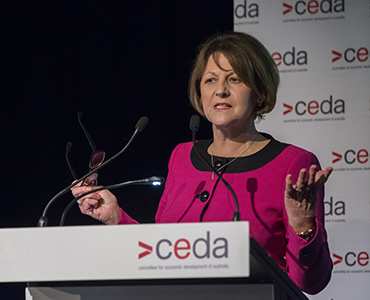The missing link in developing an effective e-Health system is integration, former Victorian Minister for Health and Western Health Chair, the Hon. Bronwyn Pike has told a CEDA event in Melbourne.

“Our ambition for all of us here and anyone in this space is to bring quality healthcare to every Australian across what is a very fragmented and very inequitable system,” she said.
Ms Pike said technology can empower health consumers and improve productivity.
The e-Health record and work that has been done by the Federal Government is promising but there is more scope for patients to be engaged.
“If using e-Health was super easy both at a provider level and of course for government who often fund all of that provision and of course for people who are really seeking to provide the resources to providers and to individuals, we would be a lot further down this track than we already are,” she said.
In Australia, creating a proper e-Health system will help reduce unnecessary hospital admissions and duplications especially for the two per cent of patients who account for 40 per cent of health costs, she said.
Also speaking at the event, Federal Department of Health Strategic Health Systems and Information Special Advisor, Paul Madden said better management of those two per cent of patients is the key target area.
On e-Health, Mr Madden said the system which has been in place since 2012 currently has 2.4 million registered patient users.
“E-Health records allows doctors, hospitals and any healthcare provider to view and share an individual’s healthcare information on the basis that they’re involved in their care,” he said.
Mr Madden said the take up in terms of healthcare providers is quite high but the number who actively use eHealth is quite low.
The system is currently being trialled to be on an opt-out basis for patients rather than opt-in to encourage more people and practitioners to use it.
On the topic of innovation, Mr Madden said non-government entities need to innovate and develop new products for e-Health to progress but the challenge is in providing access to data and information.
Also speaking at the event GSK Vice President and General Manager Geoff McDonald said healthcare will evolve with technology just as other industries have.
Mr McDonald said there are legitimate concerns and issues around privacy and access to data.
“We’ve got to find a way to shift the debate, we’ve got to find a way to get beyond some of those barriers and move forward,” he said.
It is about integration between the data of pharmaceutical companies, regulators and researchers he said.
At GSK Mr McDonald said “the R&D model was changed and opened up to a model where we collaborate outside.”
There is promise in healthcare for a digital revolution he said.
“The question is how we get the agility, the speed of the tech industry but maintain the governance of a science led healthcare system,” he said.